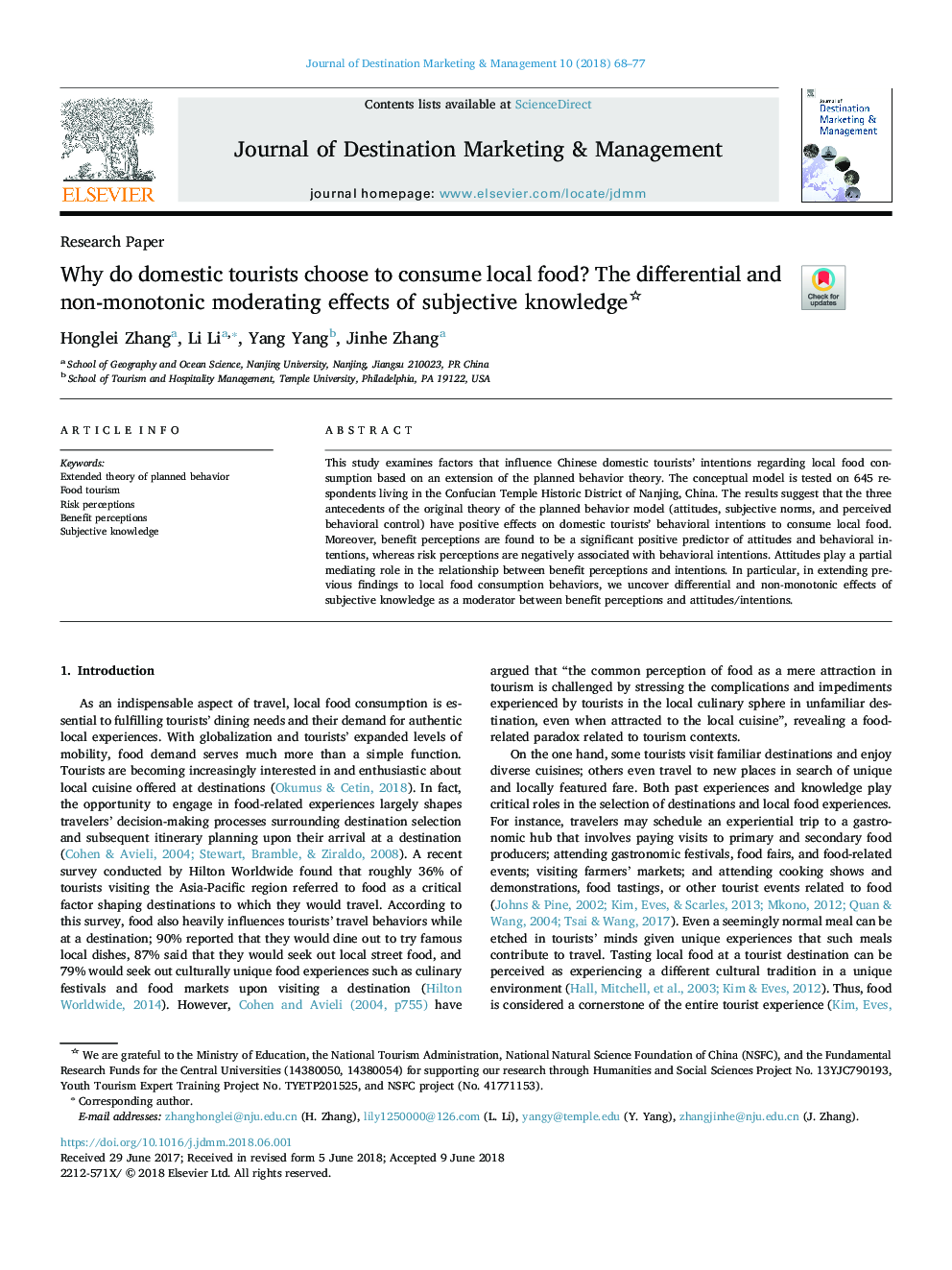| کد مقاله | کد نشریه | سال انتشار | مقاله انگلیسی | نسخه تمام متن |
|---|---|---|---|---|
| 7419251 | 1482561 | 2018 | 10 صفحه PDF | دانلود رایگان |
عنوان انگلیسی مقاله ISI
Why do domestic tourists choose to consume local food? The differential and non-monotonic moderating effects of subjective knowledge
ترجمه فارسی عنوان
چرا گردشگران داخلی تصمیم می گیرند غذای محلی مصرف کنند؟ اثرات متفرقه و غیر مونوتونیک معرفت شناختی ذهنی
دانلود مقاله + سفارش ترجمه
دانلود مقاله ISI انگلیسی
رایگان برای ایرانیان
کلمات کلیدی
نظریه گسترش رفتار برنامه ریزی شده، گردشگری مواد غذایی، درک ریسک، مزایای درک، دانش ذهنی،
ترجمه چکیده
این مطالعه عوامل موثر بر نیت گردشگران داخلی چینی در مورد مصرف مواد غذایی محلی را بر اساس گسترش نظریه رفتار برنامه ریزی شده بررسی می کند. مدل مفهومی بر روی 645 نفر از پاسخ دهندگان که در ناحیه تاریخی معبد کنگوئی نانجینگ، چین زندگی می کنند، آزمایش شده است. نتایج نشان می دهد که سه پیش فرض تئوری اصلی مدل رفتار برنامه ریزی شده (نگرش، هنجارهای ذهنی و کنترل رفتاری درک شده) تاثیر مثبتی بر نیت های رفتاری گردشگران داخلی برای مصرف مواد غذایی محلی دارد. علاوه بر این، ادراک مزایا به عنوان یک پیش بینی کننده مثبت از نگرش و نگرش های رفتاری محسوب می شود، در حالی که ادراکات ریسک با نیت های رفتاری منفی ارتباط دارد. نگرش نقش میانجی گری در رابطه بین ادراکات و نیت های مزایا ایفا می کند. به طور خاص، در گسترش یافته های قبلی به رفتار مصرف مواد غذایی محلی، اثرات افتراقی و غیر مونوتونیک دانش ذهنی را به عنوان مدعی بین ادراکات سود و نگرش / نیت ها کشف می کنیم.
موضوعات مرتبط
علوم انسانی و اجتماعی
مدیریت، کسب و کار و حسابداری
کسب و کار، مدیریت و حسابداری (عمومی)
چکیده انگلیسی
This study examines factors that influence Chinese domestic tourists' intentions regarding local food consumption based on an extension of the planned behavior theory. The conceptual model is tested on 645 respondents living in the Confucian Temple Historic District of Nanjing, China. The results suggest that the three antecedents of the original theory of the planned behavior model (attitudes, subjective norms, and perceived behavioral control) have positive effects on domestic tourists' behavioral intentions to consume local food. Moreover, benefit perceptions are found to be a significant positive predictor of attitudes and behavioral intentions, whereas risk perceptions are negatively associated with behavioral intentions. Attitudes play a partial mediating role in the relationship between benefit perceptions and intentions. In particular, in extending previous findings to local food consumption behaviors, we uncover differential and non-monotonic effects of subjective knowledge as a moderator between benefit perceptions and attitudes/intentions.
ناشر
Database: Elsevier - ScienceDirect (ساینس دایرکت)
Journal: Journal of Destination Marketing & Management - Volume 10, December 2018, Pages 68-77
Journal: Journal of Destination Marketing & Management - Volume 10, December 2018, Pages 68-77
نویسندگان
Honglei Zhang, Li Li, Yang Yang, Jinhe Zhang,
